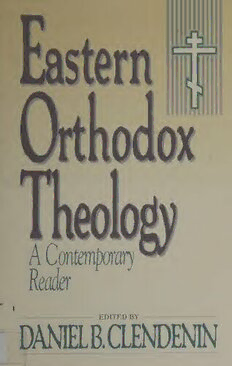Table Of ContentInternational Christian College
110 St lames Road
Glasgow
G4 0PS
Eastern
Orthodox Theology
INTERNATIONAL
CHRISTIAN COLLEGE
1 2 JUN 2000
|
13 MAR 2001
2 3 MAR 2001
Eastern
Orthodox Theology
A Contemporary Reader
Edited by
Daniel B. Clendenin
Visiting Professor, Moscow State University
D» BakerBooks
A Division of Baker Book House Co
Grand Rapids, Michigan 49516
© 1995 by Daniel B. Clendenin
Published by Baker Books,
a division of Baker Book House Company
P.O. Box 6287
Grand Rapids, Michigan 49516-6287
Printed in the United States of America
All rights reserved. No part of this publication may be reproduced, stored in a retrieval sys-
tern, or transmitted in any form or by any means—electronic, mechanical, photocopy, re-
cording, or any other—without the prior written permission of the publisher. The only
exception is brief quotations in printed reviews.
Library of Congress Cataloging-in-Publication Data
Eastern Orthodox Theology : a contemporary reader / edited by Daniel
B. Clendenin
p. cm.
“Designed as a companion to ... Eastern Orthodox Christianity”—
Introd.
Includes bibliographical references.
ISBN 0-8010-2589-3
1. Orthodox Eastern Church—Doctrines. 2. Theology, Doctri¬
nal—History—20th century—Sources. I. Clendenin, Daniel B.
II. Clendenin, Daniel B. Eastern Orthodox Christianity.
BX320.2.E28 1995
230'. 19—dc20 95-3044
CIP
Contents
Introduction 7
Part 1 Theology as Worship:
Liturgy and Sacraments
1 The Earthly Heaven 11
Timothy (Kallistos) Ware
2 Concerning the Sacraments 21
John Karmiris
3 The Meaning and Content of the Icon 33
Leonid Ouspensky
4 The Virgin and the Saints in Orthodoxy 65
Sergius Bulgakov
Part 2 Theology as Tradition:
Councils and Fathers
5 Doing Theology in an Eastern Orthodox Perspective 79
John Meyendorff
6 The Function of Tradition in the Ancient Church 97
George Florovsky
7 The Authority of the Ancient Councils
and the Tradition of the Fathers 115
George Florovsky
8 Tradition and Traditions 125
Vladimir Lossky
5
6 Eastern Orthodox Theology
Part 3 Theology as Encounter:
God, Christ, and Humanity
9 Apophasis and Trinitarian Theology 149
Vladimir Lossky
10 The Procession of the Holy Spirit
in Orthodox Trinitarian Theology 163
Vladimir Lossky
11 Partakers of Divine Nature 183
Christoforos Stavropoulos
Part 4 Theology as Mission:
Orthodoxy and the West
12 The Missionary Imperative in the Orthodox Tradition 195
Alexander Schmemann
13 Moment of Truth for Orthodoxy 203
Alexander Schmemann
Bibliography 211
Scripture Index 217
Subject Index 219
Introduction
T
he great Orthodox liturgical scholar Alexander Schmemann
once observed that despite some interaction between Eastern
Orthodox and Western Christians, the Orthodox heritage had
never really been “integrated” into the consciousness of Westerners, many
if not most of whom still view Orthodoxy as “marginal, exotic, [and] ori¬
ental.” Similarly, in the preface to his book Journeys to Orthodoxy, which is
a series of autobiographical accounts by converts to Orthodoxy, Thomas
Doulis notes that even today Orthodox Christianity remains “the great
unknown among American religious denominations.”
This collection of readings is intended to rectify, at least in some small
way, this unfortunate state of affairs, and to introduce Western believers,
both Catholic and Protestant, to the rich tradition of Eastern Orthodox
Christianity. Specifically, the readings have been selected to introduce
some of the distinctive themes and most important modern theologians of
Orthodoxy.
This volume has been designed as a companion to my exposition of
Orthodoxy, Eastern Orthodox Christianity (Grand Rapids: Baker, 1994). In
that volume I offer an apologia for the study of Orthodoxy, present a brief
history of Eastern Christianity, and then focus on four major theological
themes—apophaticism, icons, Scripture and tradition, and theosis. A final
chapter offers a Protestant evaluation of Orthodox theology.
But can the Orthodox tradition be learned from a book? The story is
told of a Protestant believer who asked an Orthodox priest to explain his
theological beliefs. The priest responded that it would be better to ask “not
what we believe, but how we worship.” Above all things Orthodoxy is a
liturgical tradition which takes quite literally the maxim, usually attrib¬
uted to Pope Celestine I (422-32), “Lex orandi est lex credendi et agendi”
(“the rule of prayer is the rule of belief and action”). While Westerners
tend to learn their theology from books in the library, Orthodoxy special-
7
Eastern Orthodox Theology
izes in learning theology from the liturgy and worship in the sanctuary. Of
course, as the selections of this anthology show, Orthodoxy enjoys an
extraordinarily rich intellectual legacy (just as Western Christians are not
bereft of rich liturgies), one that extends as far back as the great champion
of trinitarian orthodoxy, Athanasius, and continues unabated today. Still,
readers of the following essays must not mistake scholarly analyses of
Orthodoxy for the liturgical experience of worship that is so characteristic
of its heritage.
Numerous people offered their help and advice in the production of this
volume. I would especially like to thank John Breck and Paul Meyendorff
of St. Vladimir’s Orthodox Theological Seminary, James Stamoolis of
Wheaton College, Bradley Nassif of the Society for the Study of Eastern
Orthodoxy and Evangelicalism, librarian Keith Wells of Trinity Evangel¬
ical Divinity School, and editors Jim Weaver and Ray Wiersma of Baker
Book House.
Daniel B. Clendenin
The International Institute for Christian Studies
Mount Hermon, California

